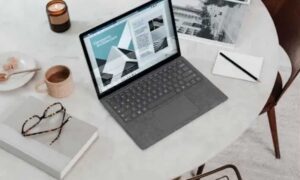Start this article from here.
Which laptop is best for me? Laptop shopping can be exasperating. Here’s how to sort through the acronyms, storage options, and extra features to find the one that’s right for you.
Buying a laptop can be difficult, even if you know what you want and what it means, and navigating manufacturers’ websites can be time-consuming.
This guide provides an overview of the major components of modern laptops, breaking down the jargon and explaining them in layman’s terms. We’ve updated specifications and minimum recommendations for Intel and AMD chips, noted CES updates, and added thoughts on PCIe-based SSDs versus eMMC SSDs.
Which laptop is best for me in 2023?
Choosing the best laptop can be a difficult task. With so many different models available, it can be difficult to determine which laptop is best for me. Before purchasing a laptop, it is critical to consider your needs and the features you require. Factors such as battery life, processor speed, RAM and storage capacity should all be taken into consideration. Additionally, budget and brand preference may also play an important role in determining which laptop is best suited to your individual needs.
System Requirements Minimum and Recommended
(Image credit: salisonline.org)
The minimum and recommended specifications for running basic software on a laptop, as well as basic tasks such as using Microsoft Excel or any other Microsoft Office program. We recommend choosing a machine that meets or exceeds these specifications for smooth performance and long durability. The system requirements are as follows.
CPU 10th Gen Intel Core i3 10th Gen Intel Core i5 or better
RAM 8GB | 16GB.
Storage: 256GB SSD | 512GB SSD.
Display: 13.3-inch FHD (1920 x 1080) | 15.6-inch FHD IPS (1920 x 1080).
Battery: Up to 5 hours | Up to 10 hours.
How to Choose the Right Laptop?
Choosing the best laptop computer can be a difficult task, but it can be made much easier with the right information. Here are some things to consider when choosing the right laptop for your needs.
Purpose: What do you need the laptop for? Is it for work, school, gaming, or just browsing the web? Knowing the purpose of the laptop will help narrow down your choices.
Budget: Before you start shopping for a laptop, decide how much you’re willing to spend.
Operating system: There are four major operating systems: Windows, macOS, Linux, and Chrome OS. Each has its advantages and disadvantages, so consider what you’re most comfortable with and what you need for your purposes.
Size and weight: Laptops come in a variety of sizes and weights, so consider how portable you need the laptop to be.
Screen size and resolution: The screen size and resolution of your laptop will affect its visual quality, so consider your preferences and needs.
Processor and RAM: These are critical components that influence your laptop’s speed and performance. Consider what you need for your specific requirements.
Storage: Determine how much storage space you require for your files and programs. Laptops typically come with either solid-state drives (SSD) or hard disk drives (HDD), each with its advantages and disadvantages.
Battery life: Battery life is an important consideration if you intend to use your laptop on the go.
Brand and customer service: Consider the reputation of the brand and the quality of customer service, as you may need support if you encounter problems with your laptop.
First Choose the Operating System.
(Image credit: hitechwhizz.com)
Before purchasing a laptop, it is important to consider which operating system is best for you and what software you need to run. This will help determine the hardware you need.
There are four major operating systems for computers. Each has advantages and disadvantages. Here’s a rundown of each:
Windows: Windows is a popular operating system for Microsoft applications, and there are more Windows laptops available than any other. See our picks for the finest laptops, gaming laptops, and cheap laptops.
macOS: Although macOS is more user-friendly than Windows, it is inextricably linked to Apple’s hardware. We have a separate guide to choosing the best MacBook because Apple uses its chips and Macbooks are a different beast.
Chrome OS: Chrome OS is a good choice if you want to do most of your laptop tasks in a web browser. It is also one of the least expensive options available, but apps such as Adobe’s Creative Suite and Microsoft Office will not work. Some apps, such as Office, have an Android phone/tablet version that you may be able to install on your Chromebook, but Android apps don’t always run well. Check out our Best Chromebooks guide.
Linux: Linux can be installed on almost any laptop hardware, but popular applications such as Microsoft Office and Adobe’s Creative Suite do not support it. Free, open-source alternatives such as LibreOffice, Darktable, and GIMP can be used instead.
Top 5 Best Laptops for you.
The best laptop in 2023 is available in a variety of brands, prices, and features, including Windows 10 business notebooks, gaming laptops, Chromebooks, school laptops, and 2-in-1 convertibles.
-
Apple MacBook Air (M2)
The best laptop of 2022
One of the most recent MacBook Air, powered by Apple’s M2 processor, is the best laptop for the majority of users.
The base model starts at $1,199 and includes 8GB of memory, 256GB of storage, an 8-core CPU, and an 8-core GPU. A model with 512GB of storage, which is what we recommend for most people and will allow you to use the laptop for a longer period. The Air has lost its wedge-shaped design but retains its features such as MagSafe charging, Touch ID, and the scissor-switch keyboard. It also adds a 1080p webcam and two new color options.
The M2 processor inside the MacBook Pro is a beast, handling heavy office workloads with little to no heat or slowdown. It provides a combination of power and portability that is not found in many other machines.
The M2 MacBook Air didn’t have as much battery life as the 16-inch M1 Pro MacBook, but we still expect it to last a full day of continuous use. Apple is still selling the M1 MacBook Air, which debuted in 2020, so if it is out of your price range, consider the M1 model.
-
HP Spectre x360 14
The best Windows laptop
It’s difficult to find a single complaint about the Spectre x360 14. It’s a stunning machine with a solid build and a premium look and feels. The Spectre x360 14 is a great laptop for everyday use, with Intel’s latest 11th Generation processors and Iris Xe integrated graphics delivering snappy performance and 10 hours of battery life.
The Spectre is a convertible laptop with a large 3:2 display, OLED and 1,000-nit options, and a stylus magnetically attached to the side. It also features a comfortable keyboard and smooth touchpad, bass-heavy audio, and a wide port selection. Such a comprehensive set of features is not cheap, and many customers will find everything they require in a less expensive product. The Spectre x360 14 is, however, the new gold standard in Windows convertibles. Overall, it is the best Windows laptop available.
-
Asus ROG Zephyrus G15
The best gaming laptop
The Zephyrus G15 is one of the lightest 15-inch gaming laptops available, weighing just over four pounds. However, you are not sacrificing performance for portability. The G15 is powered by the best mobile chips from AMD and Nvidia, and it comes with a fast 165Hz QHD display. During our testing, the system was able to run even the most demanding AAA titles at QHD resolution.
-
Asus Chromebook Flip CX5
The best 15-inch Chromebook
Asus surprised us with the Chromebook Flip CX5, a stunning $800 laptop that runs Chrome OS. It’s as sturdy and well-built as all kinds of Windows laptops at higher price points and sports a uniquely smooth texture. It has full laptop specifications, including a 57Wh battery that provides fast performance, long battery life, and quick charging.
There are numerous ports available, including an HDMI port and a microSD slot. The speakers sound fantastic, and the keyboard is extremely comfortable. Asus hasn’t skimped on the CX5’s chassis or performance — it’s the product to get if you want a Chromebook with a large screen.
-
Dell XPS 13
The best laptop for college
The Dell XPS 13 is a small and dependable laptop. Its attractive design, excellent 16:10 display, and excellent performance make it an excellent choice for general-purpose users. My review unit (an i7 model) breezed through the work tasks I assigned with no lag or heat. It did quite well in both gaming and media work.
A fancier Dell XPS 13 Plus is also available for purchase, with all kinds of new features that the XPS 13 lacks, such as an OLED display option, borderless haptic touchpad, and LED touch function keys. We’re excited to put that model through its paces very soon.



































